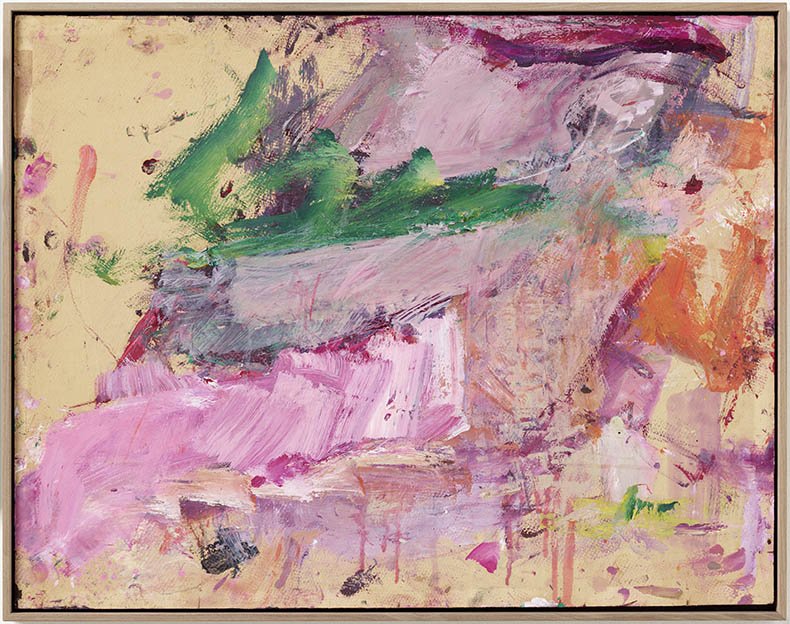Drawing on her personal experiences, Greek mythology, art history and political events, Austrian artist Martha Jungwirth creates abstract compositions that take shape spontaneously during the painting process and often hold visible traces of the artist’s body: finger marks, scratches, smears, shoe-prints. In her 1988 manifesto ‘the ape in me’, she described her method as: ‘back to the old brains, to the senso-motoric / to before spoken language / to before perception / to before memory / to before Euclid where the straight lines meet at the / vanishing point / not thinking while painting.’ Her latest exhibition at Thaddaeus Ropac in London, ‘All Will Fall’ (31 May–30 July 2022), borrows its title from an etching by Goya and includes a new series of oil paintings, all created this year.
Where is your studio?
The studio is in the third district, a 20-minute walk from Vienna’s city centre. It is located in the backyard of a former dairy, or a dairy factory, and is surrounded by other studios. Until 2012 it was the studio of Franz West.
What do you like most about the space?
The light! The studio is bright and spacious, with high walls – I like the spaciousness and the light most of all. It’s a good place to work!
What frustrates you about it?
That it is not near the ocean.
Do you have a studio routine?
I change my clothes, put on my painter’s garb, and then, if I have to, I wash my brushes. It’s not a beloved job, sometimes more of a displacement activity. If it’s a good day, I can then start.

Ohne Titel, aus der Serie “Hexenflug” (2022), Martha Jungwirth. © Martha Jungwirth / Bildrecht, Wien, 2022
How messy is your studio?
Order within the chaos, that’s how I would describe it. My grandmother always said I was sloppy – I guess I’ve perfected that over the years.
What does it smell like?
Like oil paint and turpentine. And of flowers, beautiful bouquets that dear people drop off for me.
What’s the most unusual object in there?
An old Danish cutting machine made of cast iron and painted bright orange. It stands on the kitchen counter and every visitor puzzles over what was cut with it in the past: bread, sausage, cabbage heads…
What’s most well-thumbed book in your studio?
I usually read several books at the same time. At the moment, I am very interested in Goya. I have the current exhibition catalogue from the Fondation Beyeler in front of me, a book of Goya’s correspondence and an older, long out-of-print publication titled All Will Fall, after the etching of the same name from Goya’s Los caprichos (1797–1798). My current exhibition at Thaddaeus Ropac London is also titled ‘All Will Fall’.

Ohne Titel (Tulpenstrauß) (2022), Martha Jungwirth. Photo: Ulrich Ghezzi © Martha Jungwirth / Bildrecht, Wien, 2022
Do you pin up images of other artists’ works?
The only painting by another artist I have in my studio is The Old Man by Eugène Leroy. I hold him in high esteem. I just went to see a retrospective in Paris at the Musée d’Art Moderne – fantastic!
What’s your typical studio lunch?
A typical snack is good bread, mortadella and cheese. And wine, of course! And when we have guests, we get mussels from an Italian place around the corner, served with pumpernickel bread – delicious!
Do you listen to anything while you’re working?
No. When I work, I need quiet. But in between I like to listen to the radio.
Who’s the most interesting visitor you’ve had to your studio?
As a general rule I only allow interesting people into my studio (laughs).
Is anything (or anyone) banned?
I don’t like surprise visits or people who come just to look but don’t actually have any real interest or understanding of the art.
‘Martha Jungwirth: All Will Fall’ is at Thaddaeus Ropac, London from 31 May–30 July 2022.














![Masterpiece [Re]discovery 2022. Photo: Ben Fisher Photography, courtesy of Masterpiece London](http://zephr.apollo-magazine.com/wp-content/uploads/2022/07/MPL2022_4263.jpg)
‘Like landscape, his objects seem to breathe’: Gordon Baldwin (1932–2025)